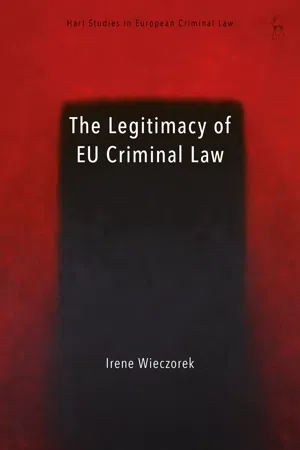I.WHY IS CRIMINAL LAW SPECIAL? A CONSEQUENCE-BASED APPROACH
In his famous 1995 article ‘The Definition of Crime’, Glanville Williams states:
[W]e have rejected all definitions purporting to distinguish between crimes and other wrongs by reference to the sort of thing that is done or the sort of physical, economic or social consequences that follow from it. Only one possibility now remains. A crime must be defined by reference to the legal consequences of the act. We must distinguish, primarily, not between crimes and civil wrongs but between criminal and civil proceedings. A crime then becomes an act that is capable of being followed by criminal proceedings, having one of the types of outcome (punishment, and so forth) known to follow these proceedings.10
In this passage, Williams highlights the difficulty in identifying a special content of the criminal law and opts for a procedural-only understanding of crimes. The accuracy of this definition, more recently re-proposed by Lipman and Molan,11 can be debated. Due to the different influence of religion on state law, homosexuality is still a crime, in some cases subject to the death penalty in other parts of the world,12 whereas same-sex marriage is being progressively legalised in a large number of Western countries. Similarly, differences in corporate culture explain why the US only criminalised insider trading late in the twentieth century when this practice was criminalised much earlier in other corporate cultures.13 Remarkably, a uniform definition of rape, an intuitively harmful behaviour, is lacking even in rather culturally homogeneous contexts like the EU.14 It appears that the countours of criminal law are to a large extent historically and geographically contingent, depending on the government in power.15 Still, a number of forms of harmful conduct which one can intuitively recognise as crimes, such as theft and assault, are traditionally found in the vast majority of criminal codes. Interestingly, Interpol has been functioning for almost a century with a scope of application defined with reference to ‘ordinary crimes’.16 This is arguably evidence of a certain international consensus on what is a crime.
In fact, criminal law scholarship has oscillated over time between formal and content-based definitions of criminal law, in what Horder defines as waves of reformation and counter-reformation of criminal legal theory.17 Be that as it may, even without embracing Glanville Williams’ total rejection of a content-based understanding of criminal law, his definition is a precious one, in that it captures one, even if not the only, specific feature of criminal law: the consequences flowing from a transgression of a criminal norm are significantly different from those flowing from violations of administrative or civil norms. As the following sections will demonstrate, they have a stronger bearing on fundamental rights. This is why criminalisation choices beg justification. Glanville Williams speaks of the kind of proceedings and the kind of outcomes. The following discussion addresses these two aspects, but reverses the order by first discussing the impact of criminal sanctions on liberty (section I.A) and dignity (section I.B), and later the kinds of criminal proceedings (section I.C). This is because, as is better illustrated below, the type of proceedings logically descends from the kind of outcome.
A.The Impact on Individuals’ Liberty as a Defining Feature of Criminal Law
Any provision of law which prescribes a certain behaviour might affect a specific fundamental right, for example, freedom of expression or in general the ‘freedom to act as one pleases’.18 Moreover, when a sanction like the payment of a fine is imposed, the individual’s right to property is affected. This can hold true for criminal law, civil law and administrative law. Yet, with minor exceptions illustrated below, it is only criminal sanctions which can affect individuals’ right to liberty, where liberty is intended as freedom of movement.
Offenders can be materially deprived of their own physical liberty as a result of criminal proceedings, first and foremost when imprisonment is imposed as a sanction following a criminal conviction.19 However, limitations of individuals’ liberty can also occur while criminal proceedings are still in progress and no conviction has yet been imposed. Suspects can be subject to preventive detention, which similarly limits their freedom of movement. Moreover, they can also be subject to a number of investigative measures which can be similarly prejudicial for one’s liberty, like body and home searches or coercive transfer before the judicial authorities for questioning.20
Admittedly, the relationship between imprisonment and criminal law is not necessarily a perfect equation. In some cases individuals can be subject to administrative detention without being convicted of a crime. These include immigration detention (for the purposes of expulsion or in the context of an asylum claim)21 and suspect terrorists’ administrative deprivation of liberty.22 Moreover, the English legal system includes a specific example of civil law detention in the case of contempt of court.23 Nonetheless, detention as a sanction attached to administrative offences remains more the exception than the rule, and material deprivation of one’s physical liberty is normally associated with criminal law proceedings.
It is worth mentioning that the idea that imprisonment actually restricts the right to liberty was challenged on a conceptual level. The Israeli Supreme Court was asked whether the right to liberty itself includes the right ‘to ignore the criminal norms defined by law as offences which entail punishment of imprisonment’,24 which would thus be restricted by imprisonment sanctions; or if the right to liberty should be interpreted as excluding the liberty to disregard these norms, and therefore imprisonment should not be considered as a restriction on liberty. Neither the Court nor the literature actually gave a definitive answer on the matter. The book thus rests on the traditional assumption that imprisonment does restrict individual liberty.
B.The Impact on Individuals’ Dignity as a Defining Feature of Criminal Law
Criminal law can also affect individual liberty intended more broadly – not simply as material liberty of movem...
